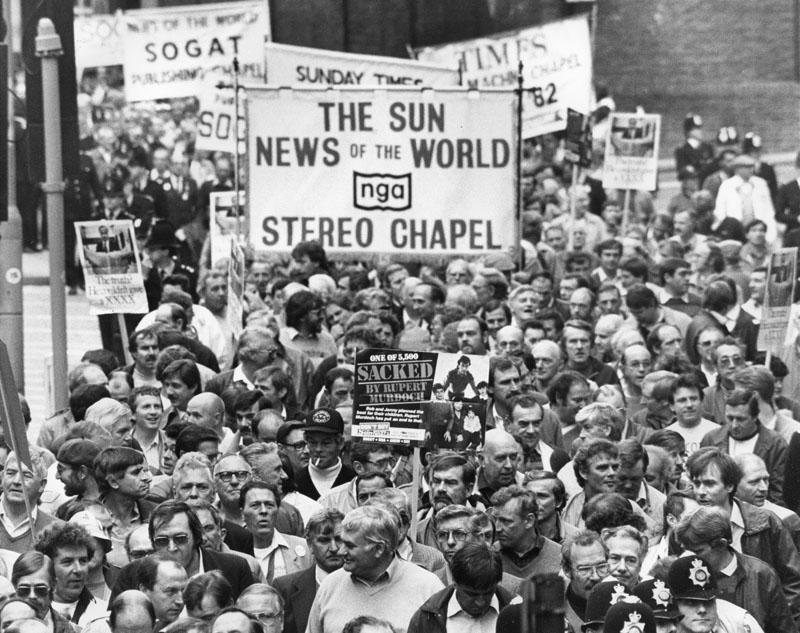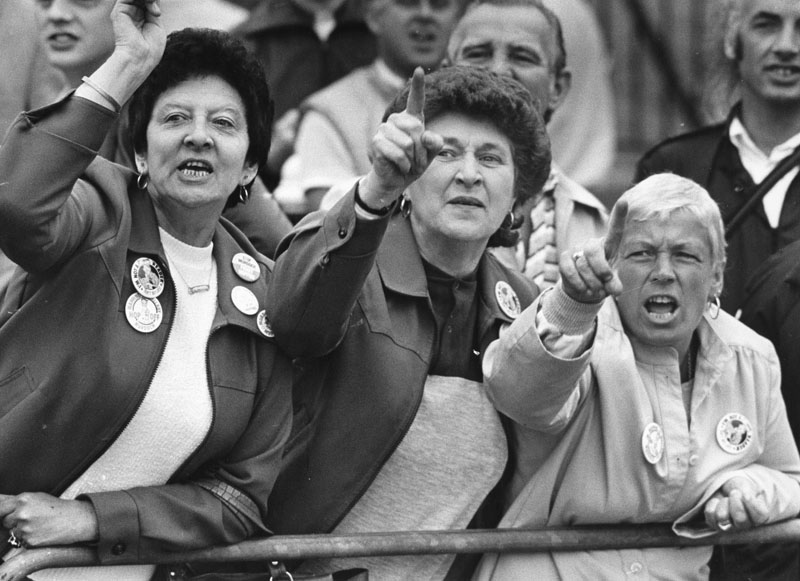Act of sheer brutality
Thirty years ago this Sunday (January 24)  Rupert Murdoch made his move to Wapping – sacking 5,500 print workers employed on his newspapers overnight.
It was an act of sheer brutality destroying lives and families.
The Wapping dispute was never about the use of computer technology – it was a stark plan to break trade unionism and to generate vast profits to expand Murdoch’s global media ambitions.
Thirty years ago Rupert Murdoch broke trade unionism in his newspapers and created profits, which he used to launch his right-wing multi-media empire, and extending his tentacles into the political class – and which lead to the phone tapping scandal, the close of the News of the World and heartbreak for families like those of Millie Dowler.
Rupert Murdoch had planned to break the print unions, long before the strike began in January 1986.
He purchased the Wapping site in the Docklands in 1979 and irrespective of any disagreements over working conditions, jobs and training, our members expected to transfer to Wapping.
But in secret, the company installed new presses and new typesetting technology well before the start of the strike.
A replacement workforce was recruited by an employment agency and the right wing leader of the electricians union; new machinery was ordered and installed, and a contract was signed for the transport of newspapers by road instead of rail.
Murdoch had declared that the new site was intended for a new London paper – the mythical London Post and Murdoch followed this up by delivering his “non negotiable” pre-conditions.
No recognition of union chapels or branches and no negotiations at local level.
These pre-conditions had nothing to do with technology, they were designed to break the print unions.
Perfect storm
Murdoch was able take advantage of the “perfect storm”: the availability of new technology; anti-union legislation brought in by Thatcher’s Tory government; a rogue union and a government willing to place the resources of the state including the Metropolitan Police at Murdoch’s disposal.
So 30 years on we can now look at the consequences of the News International dispute.
The phone hacking scandal and the involvement of the Metropolitan Police was the logical continuation of the mindset that created the anti-union Fortress Wapping in 1986, now of course closed.
News International generated massive profits to expand their empire beyond newspapers into the global media – starting with Sky and from there on he was able to dominate the right wing media by creating the rabid right wing Fox News Channel.
Politicians, prime ministers and presidents bowed the knee at the Murdoch altar.  His and his executives and management influence knew no bounds.
Murdoch’s key executives as we now know behaved like members of a despotic Banana Republic – where everyone was fair game – celebrities, footballers, politicians, lawyers, the Met, all were fearful of what could happen if you crossed Murdoch.
We should place on record the thanks to intrepid MPs such as deputy Labour leader Tom Watson and Chris Bryant MP for their fearlessness and refusal to be intimidated – and also to Ed Miliband for shaking off the fear to challenge Murdoch.
And we had the phone hacking scandal which led to Levison and the exposure of corruption, cowardice, deceit and lies.
Unite believes that the events of 30 years ago should remind us all we need to ensure we never see the media abuses we witnessed again.
The sacking of 5,500 helped Rupert Murdoch create a media organisation that has no morals, no scruples, no boundaries and no fear of the laws.
So 30 years on what cannot be denied is that breaking the print unions was about “power” and it is still all about “power” and that’s why it is important we learn the lessons of those momentous events 30 years ago.
This article first appeared in the Morning Star, January 21
 Like
Like Follow
Follow

